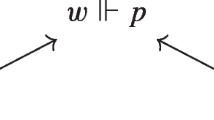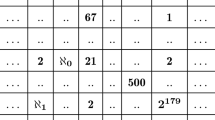Abstract
Dealing with topics of definability, this paper provides some interesting insights into the expressive power of basic modal logic. After some preliminary work it presents an abstract algebraic characterization of the elementary classes of basic modal logic, that is, of the classes of models that are definable by means of (sets of) basic modal formulas. Taking that for a start, the paper further contains characterization results for modal universal classes and modal positive classes.
Similar content being viewed by others
References
AndrÉka, H., J. F. A. K. Van Benthem, I. NÉmeti: Back and forth between modal logic and classical logic, Report ML-95-04, ILLC, Amsterdam 1995.
Benda, M., ‘Reduced products and nonstandard logic’ Journal of Symbolic Logic 34 (1969), 424-36.
Van Benthem, J. F. A. K., Temporal Logic, Report X-91-05, ILLC, Amsterdam 1991.
Van Benthem, J. F. A. K., Exploring Logical Dynamics, CSLI, Stanford 1996.
Van Benthem, J. F. A. K., J. Van Eijck, V. Stebletsova, ‘Modal logic, transition systems and processes’ Journal of Logic and Computation 4 (1994), 811-55.
Blackburn, P., M. De Rijke, Y. Venema, A Course in Modal Logic, Draft, Amsterdam 1998.
Chang, C. C., H. J. Keisler, Model Theory, North-Holland, Amsterdam 1990.
Fine, K., ‘Logics containing K4. Part I’ Journal of Symbolic Logic 39 (1974), 31-42.
Kracht, M., Tools and Techniques in Modal Logic, Habilitationsschrift, Berlin 1996.
Janin, D., I. Walukiewicz, ‘Automata for the modal μ-calculus and related results’ Proceedings MFCS'95, Springer, Berlin 1995, 552-62.
Kurtonina, N., M. De Rijke, ‘Simulating without negation’ Journal of Logic and Computation 7 (1996), 501-22.
Kurtonina, N., M. De Rijke, ‘Bisimulations for temporal logic’ Journal of Logic, Language and Information 6 (1997), 403-25.
De Rijke, M., Extending Modal Logic, PhD thesis, University of Amsterdam, ILLC, Amsterdam 1993.
Rosen, E., ‘Modal logic over finite structures’ Journal of Logic, Language and Information 6 (1997), 427-39.
Sahlqvist, H., ‘Completeness and correspondence in the first and second order semantics for modal logic’ in S. Kanger (ed.), Proc. 3rd. Scand. Logic Symp., North-Holland, Amsterdam 1975, 110-43.
Sturm, H., Modale Fragmente von \({\mathcal{L}}_{{\omega \omega }} \) und \({\mathcal{L}}_{\omega _1 \omega } \), PhD thesis, University of Munich, CIS, Munich 1997.
Sturm, H., ‘Interpolation and preservation in \({\mathcal{M}\mathcal{L}}_{\omega _1 } \)’ Notre Dame Journal of Formal Logic (to appear).
Sturm, H., ‘Modal Horn Classes’ Studia Logica (forthcoming).
Tarski, A., ‘Contributions to the theory of models. I’ Indag. Math. 16 (1954), 572-81.
Rights and permissions
About this article
Cite this article
Sturm, H. Elementary Classes in Basic Modal Logic. Studia Logica 64, 193–213 (2000). https://doi.org/10.1023/A:1005233530449
Issue Date:
DOI: https://doi.org/10.1023/A:1005233530449




